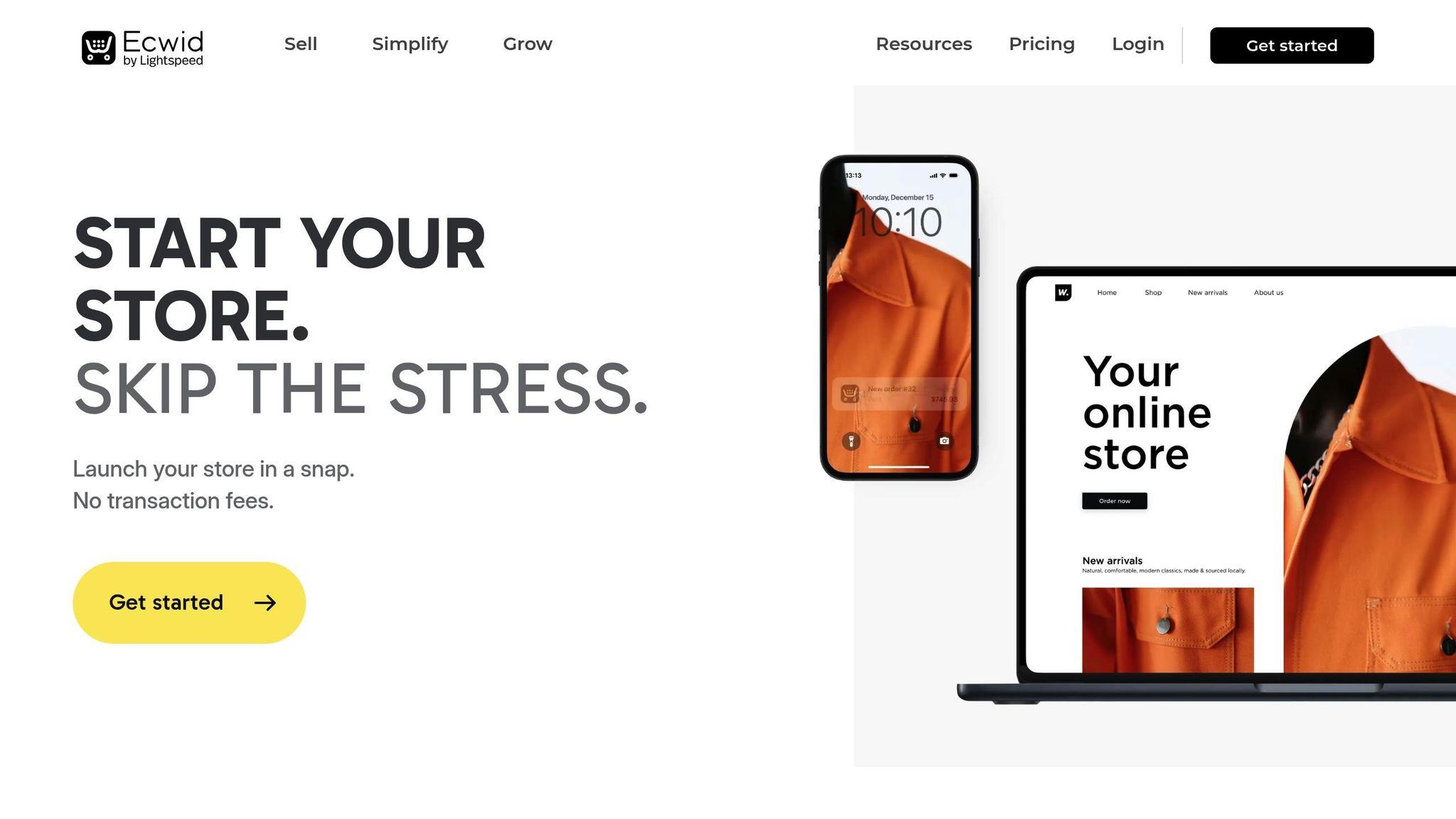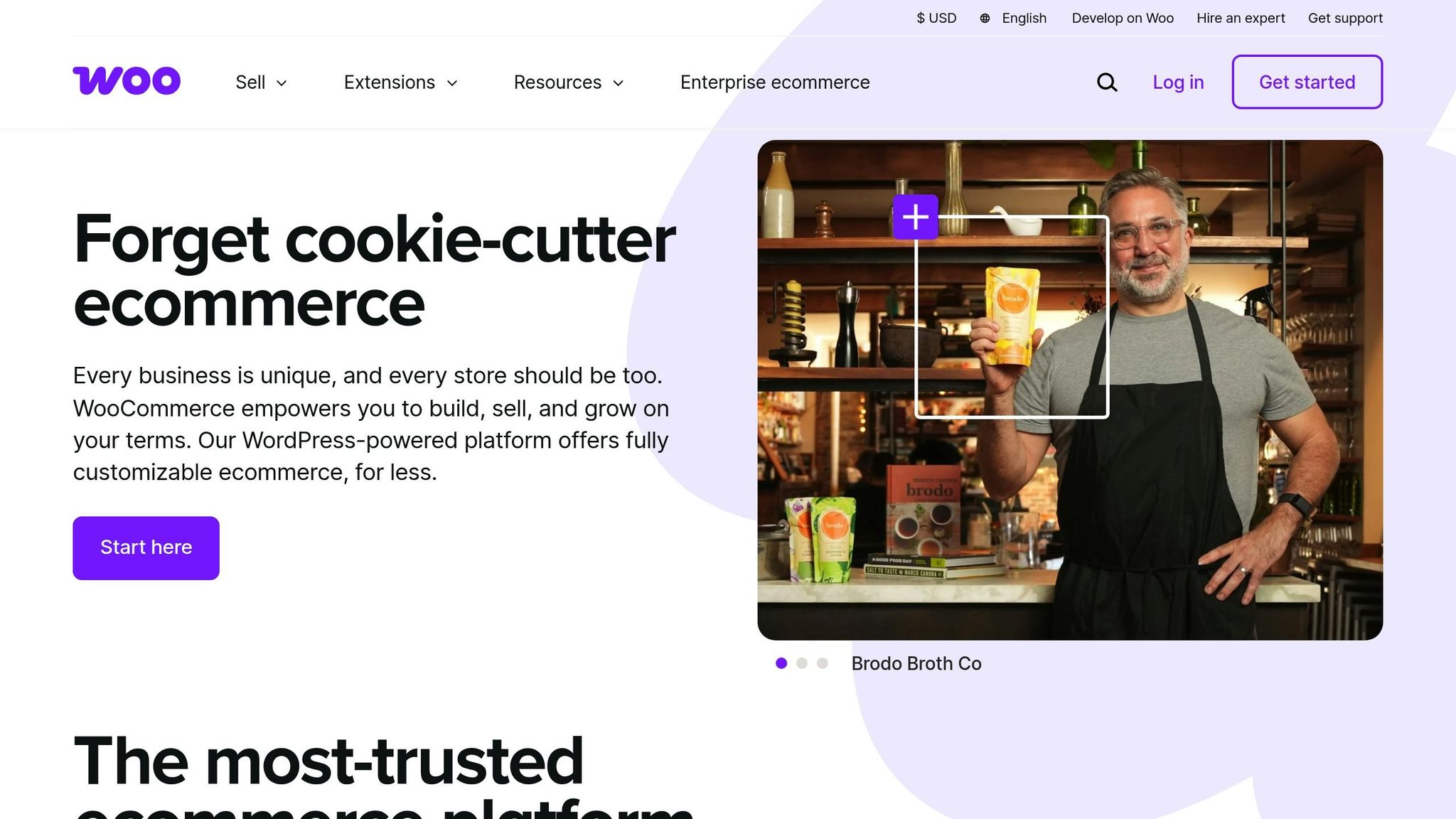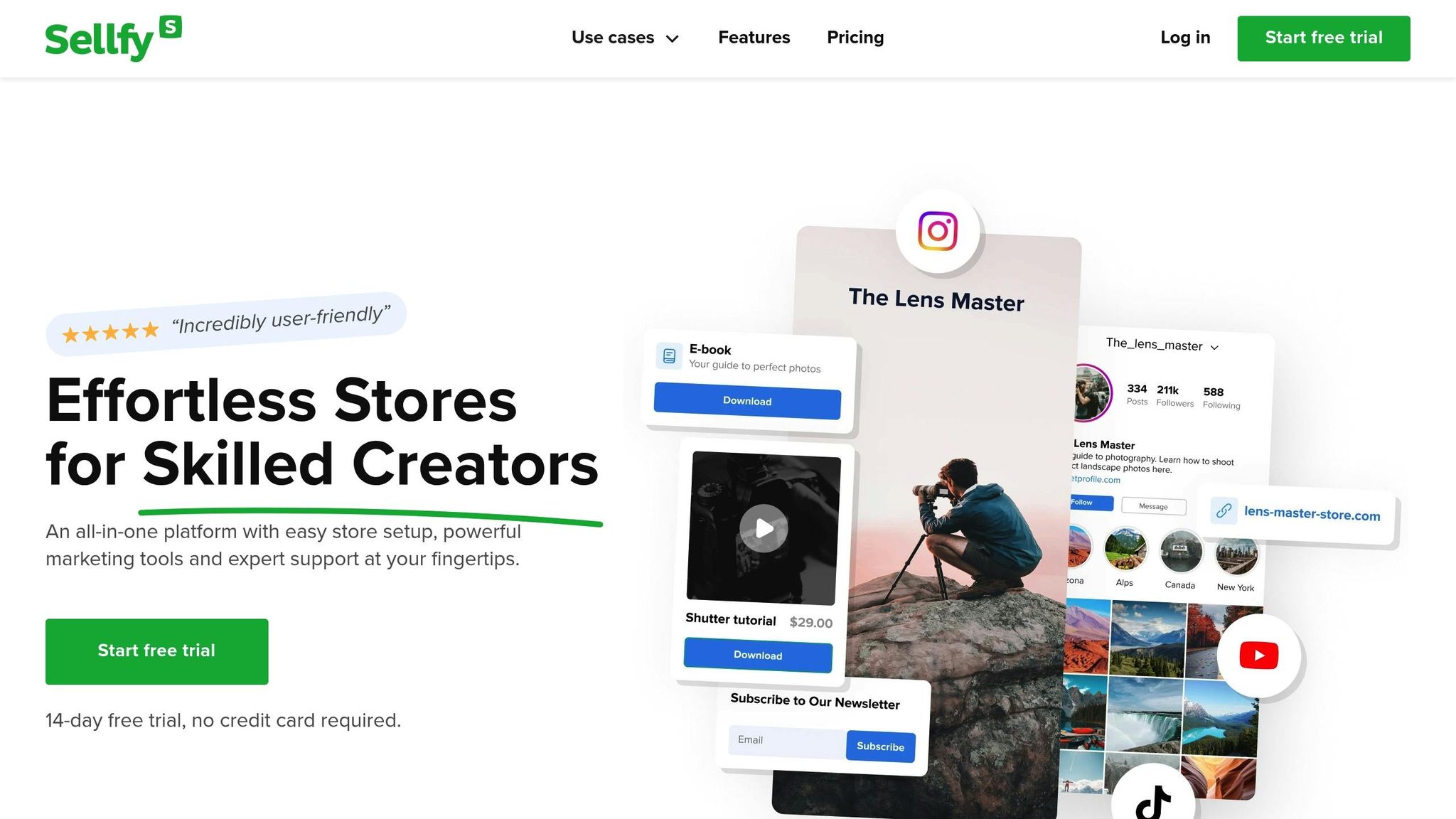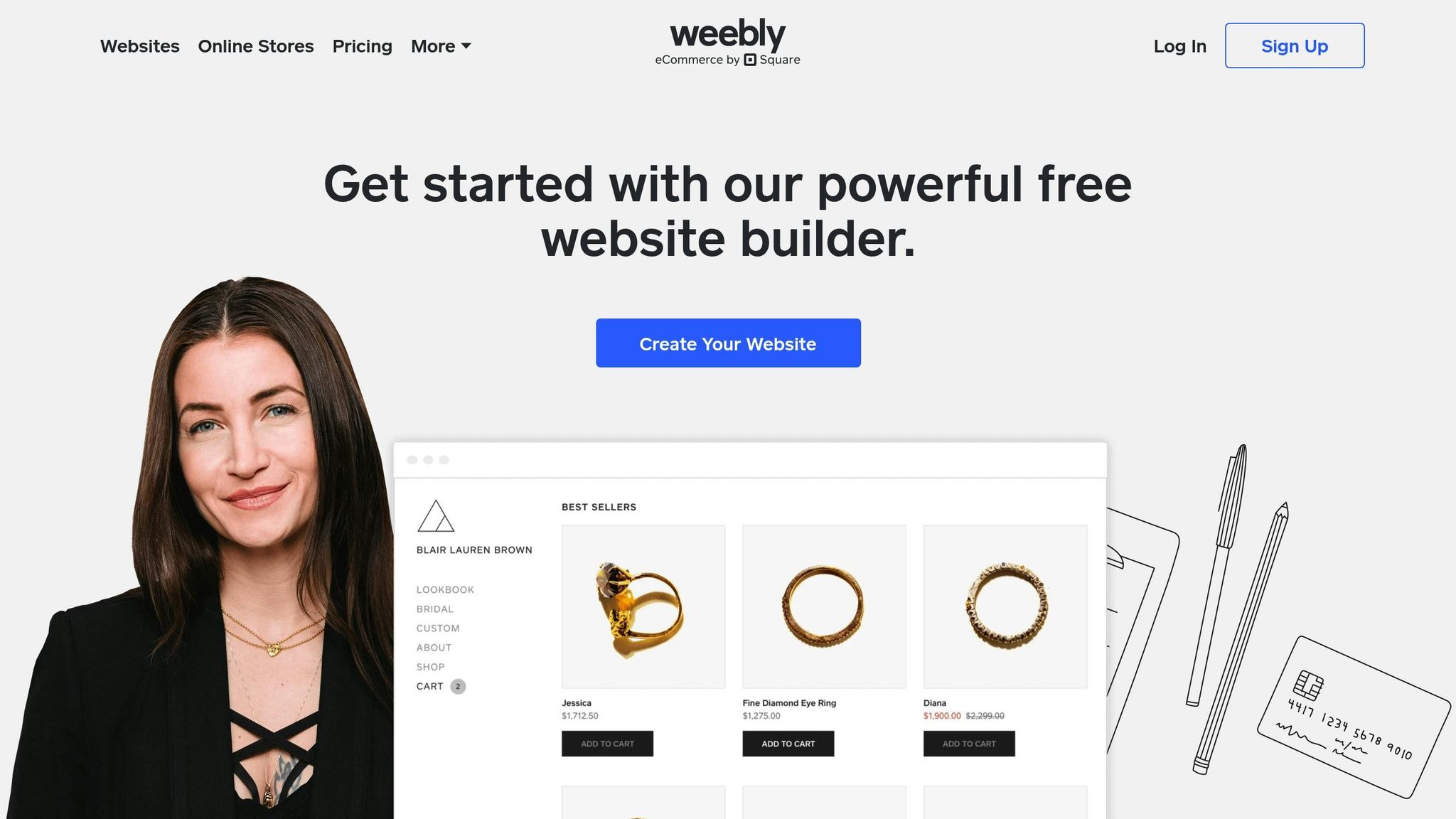Key Highlights
- Shopify: Best for scalability with plans starting at $19/month. Easy setup, AI tools, and 8,000+ apps.
- Wix: Ideal for creative businesses, starting at $17/month. Offers drag-and-drop design and marketing tools.
- BigCommerce: No transaction fees, starting at $29/month. Great for growing businesses.
- Squarespace: Design-focused, with plans starting at $16/month. Perfect for visually appealing stores.
- Ecwid: Free plan available (up to 10 products). Best for multi-channel selling.
- WooCommerce: Free plugin for WordPress users. Flexible but requires hosting and technical setup.
- Sellfy: Simple for digital creators, starting at $29/month. No transaction fees.
- Payhip: Free forever plan with 5% transaction fees. Great for solopreneurs.
- Weebly: Affordable with a free plan and beginner-friendly tools. Paid plans start at $10/month.
- Big Cartel: Free plan for up to 5 products. Focused on small-scale sellers and artists.
Quick Comparison Table
| Platform | Starting Price | Transaction Fees | Free Plan/Trial | Best For |
|---|---|---|---|---|
| Shopify | $19/month | 2.9% + $0.30 (or 2%) | 3-day free trial | Scalable businesses |
| Wix | $17/month | 2.9% + $0.30 | Free plan | Creative businesses |
| BigCommerce | $29/month | None | 14-day free trial | Growing businesses |
| Squarespace | $16/month | Varies by plan | 14-day free trial | Design-focused brands |
| Ecwid | $5/month | None | Free plan | Multi-channel sellers |
| WooCommerce | Free | Depends on payment gateway | Free | Tech-savvy users |
| Sellfy | $22/month | None | 14-day free trial | Digital product creators |
| Payhip | Free | 5% (Free plan) | Free forever | Solopreneurs and content creators |
| Weebly | $10/month | 2.9% + $0.30 | Free plan | Budget-conscious beginners |
| Big Cartel | Free | None | Free plan | Artists and small-scale sellers |
Takeaway
Choose a platform based on your budget, ease of use, and the features you need. Shopify and BigCommerce are great for scaling, while platforms like Payhip and Big Cartel are perfect for small-scale sellers or those just starting out. Want design flexibility? Squarespace and Wix are your go-to options. Test free trials or plans to find the best fit for your business.
Best E-COMMERCE websites for beginners | Shopify, Wix, Big Cartel, Squarespace
1. Shopify
Shopify stands out as a great choice for beginners in 2025, supporting over 5.65 million websites and connecting with 25.675 million shoppers worldwide.
Pricing That Works for Beginners
Shopify offers a 3-day free trial and an introductory deal of just $1/month for the first three months. After that, the Basic plan starts at $27/month, but if you opt for annual billing, you can snag a 25% discount, bringing it down to $19/month.
Here’s a quick look at Shopify's pricing plans:
| Plan | Monthly Price | Annual Price (25% Savings) |
|---|---|---|
| Basic | $27 | $19 |
| Grow | $72 | $54 |
| Advanced | $399 | $299 |
Easy Store Setup
Shopify makes creating your online store incredibly straightforward. Its drag-and-drop interface and customizable templates allow you to design a professional-looking store without needing technical skills. Recently, Shopify introduced AI-powered tools like Horizon, a new theme architecture, and an AI Store Builder that can design your store using simple keyword prompts. These tools make it easier than ever to build a store that’s ready for marketing success.
"If you want as few barriers to entry as possible, I highly recommend leveraging Shopify, because it's all in one place." - Rod Johnson, Chief Values Officer, BLK & Bold
Marketing Tools Built In
Shopify comes equipped with a suite of marketing features to help you grow your business:
- Shopify Email: Send up to 10,000 emails free every month.
- Shopify Forms: Capture leads effortlessly.
- Automated Marketing Tools: Streamline your campaigns.
- Customer Segmentation: Target specific audiences effectively.
- Shopify Inbox: Communicate with customers in real time.
These tools deliver results. For instance, Laurie Ellen, a baker, used Shopify Forms to grow her email subscriber list from 700 to over 900 in a short period.
Features Designed for Growth
Shopify provides everything you need to scale your business, including:
- 24/7 customer support
- Integrated payment processing through Shopify Payments
- Access to an extensive app marketplace for added functionality
- Built-in SEO tools to improve search visibility
- Multi-channel selling across social media platforms and marketplaces
With its Basic plan offering all the essentials and the ability to upgrade as you grow, Shopify is a platform designed to evolve alongside your business.
2. Wix
Wix has become a go-to platform for beginners, boasting a user base of over 200 million worldwide. Its intuitive tools and robust e-commerce capabilities make it an excellent choice for launching an online store.
Flexible Pricing Plans
Wix offers business plans with discounts for annual billing:
| Plan | Monthly Price |
|---|---|
| Light | $17 |
| Core | $29 |
| Business | $36 |
| Business Elite | $159 |
Every plan includes a detailed dashboard for managing your products, orders, and payments.
Easy-to-Use Store Building Tools
Wix provides two versatile editors, making it simple for beginners to design and grow their online store:
- Wix ADI (Artificial Design Intelligence): Quickly builds a personalized website based on your responses to a few straightforward questions.
- Wix Editor: Offers drag-and-drop functionality for those who want more creative control.
"When I tried Wix for building a website, I found its drag-and-drop editor fun and easy to use... If you're just starting out, Wix is totally worth giving a shot. It's user-friendly, it looks professional, and it's got everything you need to get your website up and running in no time." – Aurelija Tomkevičiūtė, Tech copywriter and security expert
Integrated Marketing Tools
Wix comes equipped with a marketing suite that includes SEO Wiz, email marketing, social media integration, blogging features, and CRM tools. These resources can help boost revenue by as much as 149%.
New Features to Watch
In March 2025, Wix introduced an integration with Printful. This addition allows store owners to seamlessly incorporate print-on-demand and dropshipping services into their online operations.
Professional Design and Merchandising
Wix offers over 900 free templates, along with tools to enhance your store's presentation, such as:
- Customizable product ribbons like "New Arrival", "Sale", or "Bestseller"
- An inventory management system
- Support for selling both physical and digital products
With 94% of shoppers forming their first impression based on website design, these features can give your store a polished, professional edge. Plus, Wix provides 24/7 customer support and a wealth of tutorials and guides to ensure you get the most out of the platform.
Next, let’s dive into BigCommerce, another excellent option for beginners.
3. BigCommerce
BigCommerce stands out as a solid eCommerce platform with a pricing structure that's easy to understand and features designed to support businesses as they grow. It combines powerful tools with an interface that's approachable, even for beginners.
Clear Pricing Without Surprises
BigCommerce keeps things simple with a straightforward pricing model - no hidden transaction fees to worry about:
| Plan | Monthly Price | Annual Price (Save) | Annual Sales Limit |
|---|---|---|---|
| Standard | $39 | $29 | Up to $50,000 |
| Plus | $105 | $79 | Up to $180,000 |
| Pro | $399 | $299 | Up to $400,000 |
Features That Come Ready-to-Use
Even the Standard plan is packed with useful tools, including single-page checkout, gift cards, product reviews, a built-in blog, and free sitewide HTTPS with SSL encryption for added security.
Sell Everywhere
BigCommerce makes it easy to expand your reach by enabling sales across multiple channels. You can list your products on platforms like Amazon, eBay, Walmart, Facebook, and Instagram, helping you connect with more customers.
AI-Powered Tools at Your Fingertips
In collaboration with Google Cloud, BigCommerce offers AI-driven tools, including the free Big AI Copywriter. This tool helps you create clean, professional product descriptions that are easy to read, using bullet points and well-spaced text.
High Marks from Users
BigCommerce has earned a 4.4/5 rating on Gartner Peer Insights, with 91% of users recommending the platform. One reviewer from April 7, 2025, praised the platform for its "scalability for growth with built-in features that constantly update and integrate without checkout transaction fees".
Easy Setup Process
Getting started with BigCommerce is straightforward, thanks to its structured setup dashboard. The process includes:
- Adding individual products to familiarize yourself with the system
- Following the guided setup steps
- Configuring essential store settings before diving into design
For businesses worried about cart abandonment - an issue affecting 70% of online shopping carts - the Plus plan includes abandoned cart recovery emails. These emails are six times more effective than standard marketing emails, making them a valuable tool for boosting conversions.
4. Squarespace
Squarespace blends elegant design tools with powerful e-commerce features, making it an ideal pick for beginners who want to build visually appealing online stores - no coding required.
Simple Pricing Options
Squarespace keeps things straightforward with four pricing plans:
| Plan | Monthly Price | Annual Price | Best For |
|---|---|---|---|
| Basic | $25 | $16 | Getting started |
| Core | $36 | $23 | Growing businesses |
| Plus | $56 | $39 | Scaling operations |
| Advanced | $139 | $99 | Established stores |
Annual plans include a free custom domain for the first year, and their Commerce plans remove transaction fees entirely.
Top-Notch Design Features
Squarespace is known for its exceptional design tools, helping users create professional-grade stores with ease:
- Fluid Engine: A drag-and-drop editor that makes layout customization simple and intuitive.
- Blueprint AI: An AI-powered tool that designs websites tailored to your brand, increasing successful launches by 10% and cutting image search time by 18%.
- Layout Switcher: Quickly preview and rearrange content with pre-designed layouts.
- Design Elements: Access premium fonts from Google and TypeKit, plus free high-quality images from Unsplash.
Built-In Marketing Tools
Squarespace includes a marketing suite designed to help sellers grow their audience and boost engagement. Its email marketing system boasts double the open rates of standard campaigns.
"Squarespace SEO tools can maximize your online presence so your site shows up more often and to more people." - Squarespace
Tools for Growing Your Business
Squarespace equips beginners with essential tools to scale their online stores:
- Automated email workflows for personalized communication
- Promotional pop-ups to showcase sales or new products
- Built-in SEO tools to improve search visibility
- Custom forms for efficient client management
- Stripe integration for secure payment processing
In January 2025, Squarespace introduced 10 customizable automation workflows, making it easier than ever to engage with customers and drive growth.
Next, we’ll explore another platform to help you find the perfect fit for launching your online store. Stay tuned!
5. Ecwid

Ecwid serves as a user-friendly e-commerce platform, currently powering over 200,000 online stores globally. Its simplicity and accessibility make it an excellent choice for beginners who want to start selling online without needing technical know-how.
Pricing Options for Beginners
| Plan | Monthly Price | Annual Price | Best For |
|---|---|---|---|
| Starter | $5 | $5 | Testing the waters |
| Venture | $30 | $25/month | Small startups |
| Business | $55 | $45/month | Growing stores |
| Unlimited | $130 | $105/month | Established businesses |
The Starter plan allows users to explore the platform at no cost, while the Venture plan is ideal for those ready to launch their first store.
Easy Setup Process
Getting started with Ecwid is straightforward and doesn’t require technical skills. The platform walks you through the basics with ease:
- Simple account creation using social logins
- A user-friendly dashboard with well-organized settings
- Horizontal tabs for managing products
- Step-by-step guidance for setting up shipping and payment options
Features to Drive Sales
Ecwid combines its ease of use with a suite of sales tools designed to help you grow your online business. Here’s what you can expect:
Multi-Channel Selling
- Integrate your store with websites and social marketplaces
- Mobile-friendly storefronts for seamless browsing
Marketing Tools
- Automated email campaigns
- Customer behavior tracking
- Promotions and targeted advertising tools
Mobile Store Management
Manage your store from anywhere with mobile tools that let you:
- Track sales
- Process orders
- Update inventory
- Communicate with customers
Platform Features and Growth Support
Ecwid offers a range of features to support your business as it scales. Available in 53 languages, its paid plans unlock advanced options to help you grow.
Essential Features
- Inventory management
- Secure payment processing
- Order fulfillment
- Customer support tools
Growth-Oriented Tools
- SEO tools to improve search visibility
- Analytics for performance insights
- Customer relationship management
- Automated marketing campaigns
New users are encouraged to check their welcome email, which includes key tutorials to help them get started.
6. WooCommerce

If you're looking for a self-hosted option that gives you full control over your online store, WooCommerce is a solid choice. Unlike cloud-hosted or all-in-one platforms, WooCommerce is built as a WordPress plugin, making it a flexible option for beginners and experienced users alike. While the core plugin is free, you’ll need to budget for a few essential components to get your store up and running.
Required Setup Costs
Here’s a breakdown of the basic costs involved in setting up a WooCommerce store:
| Component | Starting Cost | Advanced Setup |
|---|---|---|
| Domain Name | $10/year | $20/year |
| Hosting | $10/month | $100/month |
| SSL Certificate | Free | $100/year |
| Premium Theme | $59 (one-time) | $129/year |
| Essential Plugins | $300/year | $1,200/year |
Setting Up Your Store
Getting started with WooCommerce is straightforward:
-
Choose a hosting provider that supports WordPress and offers one-click installation. Some popular options include:
- Hostinger: Plans start at $2.49/month
- Bluehost: Plans start at $7.45/month
- SiteGround: Plans start at $2.99/month
-
Once your hosting is set up, log in to your WordPress dashboard. Go to Plugins > Add New, search for "WooCommerce", and click Install. Follow the setup wizard to configure:
- Your store details
- Industry type
- Product categories
- Payment gateways
- Shipping options
This process ensures your store is tailored to your business needs from the start.
Marketing Tools and Growth Features
WooCommerce comes packed with tools to help you grow your business. In fact, 79% of companies rely on marketing automation to boost their performance.
"Email marketing on WooCommerce is essential for driving sales, improving customer engagement, and building long-term relationships with your shoppers."
- David Ch, Head of Marketing at Encharge
Key Marketing Features:
- Automated email campaigns to stay connected with customers
- Built-in SEO tools to improve your store’s visibility
- Integration with social media platforms for broader reach
- A customizable coupon system to drive promotions and sales
Performance Optimization
Running a WooCommerce store also means keeping it fast, secure, and reliable. Here’s a look at some optional performance tools and their costs:
| Category | Monthly Cost | Purpose |
|---|---|---|
| CDN Services | $10–$30 | Faster content delivery |
| Security Tools | $50–$300/year | Protect your store |
| Performance Optimization | $10–$100 | Improve site speed |
The beauty of WooCommerce is its scalability - you can start small and gradually invest more as your store grows. Whether it’s upgrading hosting, adding plugins, or improving performance, you’re in control of how and when to expand.
sbb-itb-fd652cc
7. Sellfy

Sellfy is a straightforward e-commerce platform designed for creators who want to launch their online store quickly. With a 4.4 out of 5 rating, it provides the tools needed to set up and manage a store without hassle.
Pricing Structure
One of Sellfy's standout features is that it charges no transaction fees across all its plans.
| Plan | Monthly Cost | Annual Cost (Save 25%) | Two-Year Cost (Save 35%) |
|---|---|---|---|
| Starter | $29 | $22/month ($264/year) | $19/month ($456) |
| Business | $79 | $59/month ($708/year) | $49/month ($1,176) |
| Premium | $159 | $119/month ($1,428/year) | $99/month ($2,376) |
These flexible pricing options make Sellfy accessible for businesses of different sizes.
Store Setup and Management
Getting started with Sellfy is incredibly fast - it takes less than five minutes to set up your store. The platform provides customizable storefront templates and supports a variety of product types, including digital items, physical goods, subscriptions, and print-on-demand products. You can upload files up to 10GB, giving you plenty of room for large digital products. Plus, the mobile app makes it easy to manage sales and track analytics on the go.
Built-in Marketing Tools
Sellfy doesn't just stop at store creation; it also helps you grow your business. Its Business and Premium plans include a suite of marketing tools like:
- Email marketing credits
- Upselling features
- Cart abandonment recovery
- Discount code creation
- Social media integration
These tools are designed to help you engage customers and boost sales.
Success Story
Debi from DeFi Creations is a great example of Sellfy's potential. She turned her passion into a full-time business using the platform.
Performance Metrics
Here’s how Sellfy stacks up, based on user reviews:
- Ease of use: 4.5/5
- Customer support: 4.5/5
- Marketing and product tools: 4.4/5
To make things even better, Sellfy offers a 14-day free trial of its Business plan, giving new sellers a risk-free way to explore its features.
8. Payhip
Let’s dive into a platform that’s tailor-made for solopreneurs and content creators: Payhip. Unlike platforms designed for larger businesses, Payhip focuses on individual creators, offering tools that are simple to use and effective. With a user base of over 130,000, it has earned glowing reviews, including a 4.5 out of 5 rating on both G2 and Capterra.
Cost Structure
One of Payhip’s standout features is its "Free Forever" plan, which grants access to all features without any revenue limits. This plan is perfect for creators who want to experiment without committing to upfront costs.
| Plan | Monthly Cost | Transaction Fee |
|---|---|---|
| Free Forever | $0 | 5% |
| Plus | $29 | 2% |
| Pro | $99 | 0% |
Keep in mind that standard PayPal and Stripe fees still apply. If you’re planning to host videos for online courses, there’s an extra $9 per month fee for up to 16 hours of video content.
Setup Process
Getting started with Payhip couldn’t be easier. The platform offers a setup wizard that walks you through the entire process step by step. Even if you’re not tech-savvy, the drag-and-drop page editor makes customizing your storefront a breeze. The process is broken down into three simple steps: add your products, configure the checkout process, and personalize your store’s design.
"I absolutely love Payhip, it's such a user-friendly platform that literally anyone can use. Having launched my first ever eBook with Payhip, everything has gone by a breeze, I couldn't be happier with how easy it is." - Cherie Tu, Vegan lifestyle advocate
Platform Features
Payhip supports a wide variety of product types, making it a versatile choice for creators. Whether you’re selling digital downloads, online courses, coaching sessions, memberships, or even physical products, Payhip has you covered. Additionally, the platform simplifies international sales by automatically handling EU/UK VAT reporting, a huge relief for creators selling across borders.
Marketing Options
Payhip includes built-in marketing tools to help you grow your business. You can create coupons with flexible discount options to attract new customers and utilize the affiliate marketing system to encourage others to promote your products. Features like cross-selling and upselling allow you to suggest additional products, while the referral system incentivizes customers to bring in their friends.
The platform also comes with email marketing tools, making it easier to build and maintain relationships with your audience. Plus, built-in customer review functionality provides valuable social proof to boost conversions.
"Payhip is fantastic. The interface is simple, the integration easy and the customer service has been top notch. I'm really glad I chose Payhip and will continue to do so in the future." - Stephen Follows, Film industry data researcher
While Payhip receives high praise for its intuitive interface and ability to manage multiple product types, some users have noted a few drawbacks, such as limited payment gateway options and basic SEO tools. Up next, we’ll explore another platform that offers even more tools to enhance your e-commerce experience.
9. Weebly

Weebly is a straightforward website builder that powers over 50 million websites worldwide. Since being acquired by Square in 2018, it has integrated seamlessly with Square's payment processing and financial tools. Like other platforms, Weebly provides beginner-friendly features to help you set up your online store with ease.
Monthly Fees
Weebly is known for its budget-friendly pricing, making it a great option for those just starting out. It even offers a free plan with basic features, though it includes Square ads.
| Plan | Annual Billing | Monthly Billing |
|---|---|---|
| Free | $0 | $0 |
| Personal | $10/month | $13/month |
| Professional | $12/month | $16/month |
| Performance | $26/month | $29/month |
The Personal plan, priced at $10 per month with annual billing, is notably cheaper than similar plans on other platforms, which often cost around $16–$17 per month. Standard processing fees are 2.9% + $0.30 per transaction.
Store Builder
Weebly’s drag-and-drop editor is one of its standout features, making it incredibly easy to design your online store. Its clean, structured layout ensures you avoid overwhelming designs, and the shopping cart is automatically set up, so you can start selling without needing technical expertise.
"What I liked most about the app was the ease of creating a website with little experience. I created a website that I am very happy with." – Jac B, Verified User
To make things even simpler, Weebly provides step-by-step guides to walk you through the process of launching your site. It’s no surprise that Capterra rates Weebly 4.5 out of 5 for ease of use.
Sales Tools
Weebly equips users with a solid set of sales tools designed to help you grow your business. Some key features include:
- A coupon builder for creating discount codes
- Custom gift card options to encourage purchases
- Integrated customer reviews to build trust with buyers
Additionally, Weebly offers email marketing tools directly from its dashboard, social media integration, and built-in site analytics to track visitor behavior and website performance. These tools work seamlessly with third-party apps to further expand your store’s capabilities.
Add-on Options
While Weebly’s core features are beginner-focused, its App Center offers a variety of third-party tools to enhance your store. For e-commerce functionality, Weebly earned a solid 4.0 out of 5 rating.
The platform also includes marketing tools like form builders and scheduling features, as well as SEO tools that let you customize URLs, title tags, meta descriptions, and image alt texts.
Weebly is an excellent choice for beginners looking for a simple, affordable way to launch their online store. It provides all the essentials to get started while offering room to grow through additional apps and features.
10. Big Cartel
Big Cartel rounds out our list as a straightforward platform tailored for creative entrepreneurs who want a no-fuss online store. With over $2.5 billion in sales processed globally through its platform, it has established itself as a dependable option for those embarking on their e-commerce journey. Designed with creative businesses in mind, Big Cartel emphasizes simplicity and accessibility, making it a great fit for beginner sellers.
Price Plans
Big Cartel keeps pricing simple and transparent, with no hidden fees. It offers three plans that grow with your business:
| Plan | Monthly Cost | Annual Cost | Product Limit |
|---|---|---|---|
| Gold | $0 | $0 | Up to 5 products |
| Platinum | $15 | $12/month | Up to 50 products |
| Diamond | $30 | $24/month | Up to 500 products |
The Gold plan is a risk-free option for beginners, allowing you to sell up to five products at no cost. As your business expands, the Platinum plan offers more flexibility for small-scale operations, while the Diamond plan supports larger inventories and includes priority support for growing businesses.
Setup Steps
Getting your Big Cartel store up and running is quick and straightforward. Once you sign up, the platform provides a checklist on the dashboard to guide you through the entire process, which can be completed in a single day. Key steps include:
- Creating an account
- Setting your store's location and currency
- Adding products
- Configuring payment and shipping options
- Customizing your store's design
The platform's intuitive interface ensures that even first-time users can navigate the setup with ease. This simplicity is a major draw for those new to e-commerce.
Marketing Tools
Big Cartel pairs its easy setup with essential marketing tools, earning a 4.5/5 rating for its features. Even the free Gold plan includes options like discount codes and promotional tools. For SEO, Big Cartel provides basic optimization features to help your store rank in search results. You can refine product titles with keywords, add compelling content, and showcase customer reviews to improve visibility and build trust.
To further expand your marketing efforts, Big Cartel integrates with around 30 specialized add-ons. It also supports Zapier, enabling connections to over 5,000 additional apps, offering flexibility to scale your marketing activities.
Store Limits
Big Cartel clearly defines its product limits, making it an ideal choice for small-scale sellers. The Gold plan allows up to 5 products, perfect for testing the platform or focusing on a curated selection. The Platinum plan increases this to 50 products, while the Diamond plan supports up to 500 items. These limits cater to artists and small businesses that prioritize quality over quantity. Additionally, Big Cartel doesn’t charge transaction fees, letting you keep more of your earnings as your business grows.
With its focus on simplicity and essential tools, Big Cartel stands out as a welcoming option for creative entrepreneurs stepping into e-commerce.
Platform Features at a Glance
Finding the right e-commerce platform means weighing the features that matter most to your business. The table below provides a quick snapshot of key offerings to help you make an informed decision.
| Platform | Starting Price | Transaction Fees | Free Trial/Plan | Apps/Integrations | Best For |
|---|---|---|---|---|---|
| Shopify | $19/month | 2.9% + $0.30 (or 2% with third-party gateways) | 3-day free trial, then $1/month for 3 months | 8,000+ apps | Scalable businesses needing extensive integrations |
| Wix | $17/month | 2.9% + $0.30 | Free plan (building only) and paid e-commerce plans | Large third-party integration library | Creative businesses seeking design flexibility |
| BigCommerce | $39/month | None | 14-day free trial | Extensive third-party options | Growing businesses looking to avoid transaction fees |
| Squarespace | $25/month | Varies by plan | 14-day free trial | 36 plug-ins | Design-focused brands and portfolios |
| Ecwid | $30/month | None | Free plan (up to 10 products) | Social media and marketplace integrations | Merchants aiming for multi-channel selling |
| WooCommerce | Free | Depends on payment gateway | Free (requires WordPress hosting) | Extensive extensions marketplace | Tech-savvy users wanting full customization |
| Sellfy | $29/month | None | 14-day free trial | Basic integrations | Digital product creators |
| Payhip | Free | 5% (Free plan) | Free Forever plan | Basic integrations | Content creators and solopreneurs |
| Weebly | $10/month | 2.9% + $0.30 | Free plan available | Basic integrations | Budget-conscious beginners |
| Big Cartel | Free | None | Free plan (up to 5 products) | 30 direct integrations and Zapier support | Creative entrepreneurs and artists |
Key Takeaways
Apps and integrations matter.
Shopify stands out with over 8,000 third-party apps, making it ideal for businesses that rely on extensive integrations. Meanwhile, Squarespace offers just 36 plug-ins, catering to brands prioritizing simplicity and design focus.
Transaction fees can add up.
Platforms like BigCommerce, Ecwid, and Big Cartel don't charge transaction fees, which can save you a lot over time. Shopify, on the other hand, charges 2.9% + $0.30 per transaction - or 2% if you use a third-party payment gateway. For businesses processing $10,000 monthly, this could mean an extra $290 to $490 in fees.
Free options offer flexibility.
Big Cartel's free plan supports up to 5 products with no fees, while Payhip's "Free Forever" plan allows unlimited products but takes a 5% transaction fee. These options are great for creators and small businesses testing the waters.
Pricing changes to watch.
In Q2 2025, Ecwid adjusted its pricing, replacing its free Starter plan with a $30/month option that includes limits on products and features. This shift reflects the rising demand for more professional-grade e-commerce tools, even at entry levels.
For beginners, platforms with free trials or low starting costs - like Shopify's 3-day free trial followed by $1/month for 3 months - make it easier to get started. Big Cartel’s permanent free plan is another standout for those just starting out. These options help you explore and grow without a big upfront commitment.
Summary
Picking the right e-commerce platform depends on a mix of factors: your budget, technical skills, and long-term business goals. With global retail e-commerce sales projected to surpass $8 billion by 2025, making an informed choice from the beginning can save you both money and headaches down the road.
Think about subscription fees, transaction costs, and other expenses alongside your comfort with technology. For example, if you're familiar with WordPress, WooCommerce might be a good fit due to its flexibility. On the other hand, hosted platforms like Shopify (G2 rating: 4.4/5) or Wix (G2 rating: 4.2/5) are beginner-friendly and simplify the setup process. Keep in mind that pricing structures vary - BigCommerce and Big Cartel don’t charge transaction fees, but other platforms might, which could impact your bottom line if you’re managing high sales volumes. Matching the platform’s complexity to your technical skills is key.
Your choice should also align with your business type and growth plans. Consider whether your focus is B2C, B2B, or a mix of both, and whether you aim to expand into physical retail or international markets. Shopify is a strong option for businesses looking to scale and integrate various tools, while Big Cartel’s free plan is perfect for artists or small-scale sellers just starting out.
To make the best decision, create a checklist that reflects your specific needs and test out different platforms to see how they perform. Calculate all costs, including payment gateway fees and app expenses, to ensure the platform fits your budget and technical abilities. It’s often smart to start with a basic plan to get comfortable, then upgrade as your sales and expertise grow.
FAQs
What should beginners look for when choosing an e-commerce platform in 2025?
Choosing an E-Commerce Platform as a Beginner in 2025
Starting your online store in 2025? Here are three essential things to keep in mind when picking an e-commerce platform:
- Ease of Use: Go for a platform with a user-friendly interface that doesn’t demand technical skills. This will make setting up and managing your store straightforward, even if you’re new to the game.
- Budget-Friendly Options: Most platforms offer pricing tiers to suit different needs. Entry-level plans often start at about $29 per month, but some platforms may have options as low as $1 per month - perfect for staying within a tight budget.
- Room to Grow: Choose a platform that can grow with your business. Features like payment processing, inventory management, and integrations will help your store scale smoothly as your sales and customer base increase.
By focusing on these aspects, you’ll set yourself up for an easier and more successful e-commerce journey.
How do transaction fees affect the cost of using e-commerce platforms, and which platforms provide the best value for beginners?
Transaction fees can take a chunk out of your earnings, particularly if you're running a small business or just starting out with limited profit margins. For instance, some platforms charge 2.9% + $0.30 per transaction. It might not sound like much at first, but as your sales increase, these fees can stack up fast.
Platforms like BigCommerce stand out because they don’t impose transaction fees, making them a more cost-effective choice for businesses aiming to keep more of their revenue. When picking an e-commerce platform, it's crucial to weigh how these fees fit with your sales volume and long-term goals to ensure you're getting the best deal.
What makes platforms like Shopify and Wix great for growing a small business compared to options like Big Cartel or Payhip?
Platforms like Shopify and Wix are great options for small businesses looking to grow, thanks to their powerful features and ability to adapt as your needs evolve. Shopify is especially popular for its growth-friendly tools, including multi-channel selling, advanced SEO capabilities, and a vast app marketplace. It’s specifically built to support businesses as they scale, making it a go-to choice for entrepreneurs with big plans.
Wix, on the other hand, shines with its easy-to-use interface and budget-friendly pricing. It provides customizable templates and built-in marketing tools, making it simple for small businesses to establish a professional online presence. While platforms like Big Cartel and Payhip might suit very small-scale ventures, they often lack the advanced tools and flexibility needed for businesses aiming for substantial growth.


